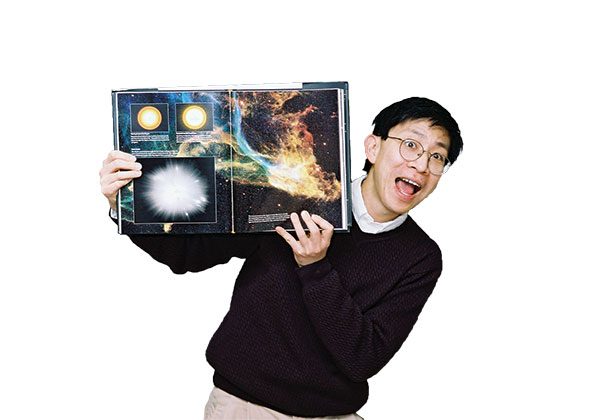
Charles Liu, 43, is a nationally known astronomer at the American Museum of Natural History’s Hayden Planetarium in New York. He helped design the museum’s spectacular glass-enclosed Rose Center for Earth and Space. He is also a professor of astrophysics at City University of New York and the author of The Handy Astronomy Answer Book for children. Liu is also working on Cosmos, a NASA-related survey of nearly 2 million distant galaxies with the goal of mapping cosmic evolution. Born in Taiwan, he came to the United States with his family as a child. He lives in Montclair with his wife and three children.
What’s the difference between an astronomer and an astrophysicist?
The difference is, if I’m sitting on a plane next to someone that I want to talk to, I tell them I’m an astronomer. If I don’t want to talk to them, I tell them I’m an astrophysicist. But seriously, modern astronomy is applying the laws of physics to the universe beyond our Earth. But astronomy transcends just physics. There are also elements of every other science, such as math, computer science, chemistry, biology and more. It’s the study of the universe and everything in it.
You primarily work on observational galaxy evolution, mainly the star-formation histories of field galaxies. What does that mean?
Galaxies are huge collections of billions of stars, plus interstellar dust, gas and dark matter. We live in the Milky Way galaxy, and our sun is one star in this galaxy. There are billions of galaxies in the universe. Galaxies are to the universe what cells are to the human body. I study galaxies to understand how the universe works. I also study the formation of stars. The birth and death of stars really dictates how these galaxies are born and how they age. By studying star-formation history, I’m studying the aging process of the cosmos.
Why is this important?
Because we want to know how everything is born, how everything ages and how everything dies. What I study won’t change the price of bread today. But it could change the course of civilization tomorrow. If you’re looking practically at astronomy, it’s been shown that every dollar given to the exploration of space has led to many dollars returned in terms of human health, technological advances, education and in preparing our later generations for the future. On a practical level it’s very important.
What does astronomy teach us?
All the great questions that we occupy ourselves with have something to do with astronomy. Are we alone? What will happen to us? The big questions that drive all humans. Like art, poetry and music, astronomy is getting at the core of who we are as human beings. We all wonder as we look at the sky at night, What’s out there? So what I do has a very practical and a very transcendent component to it. We astronomers are lucky because we share something with all humans: the sky. We’ve all wondered what’s out there. I get to do that for a living. It’s a really fun thing to do.
Do you think there is life on other planets?
There’s almost certainly life on other planets. But would we recognize it as life? We only have one model on Earth. If there were life elsewhere, we may not know it’s alive. If there’s life out there, we probably won’t intersect with it in our lifetime. A couple of months ago, NASA’s Kepler satellite detected more than 1,000 new planets outside our solar system. We may someday be talking about thousands of planets beyond our solar system. Within the next 5 or 10 years we may discover Earth-like planets.
Why is it important for people, including children, to learn about astronomy?
When a child is born, a baby knows what his crib is like, then his room and his home, then his neighborhood and town. Learning about the universe is the next step. Knowing our place in the cosmos is a way for children to put their existence into a context that truly takes into account the totality of everything. We can get bogged down in the details of life. But if we understood where we are and our place in the cosmos in space and in time, then the crappiest day in the world is still not that big of a deal. Doing astronomy gives me a sense of peace and the realization that it’s all good.



